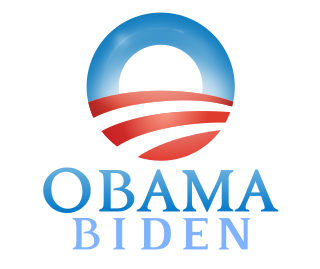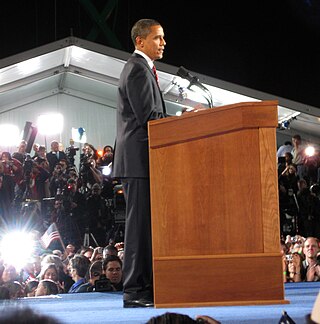Related Research Articles

An ideograph or virtue word is a word frequently used in political discourse that uses an abstract concept to develop support for political positions. Such words are usually terms that do not have a clear definition but are used to give the impression of a clear meaning. An ideograph in rhetoric often exists as a building block or simply one term or short phrase that summarizes the orientation or attitude of an ideology. Such examples notably include <liberty>, <freedom>, <democracy> and <rights>. Rhetorical critics use chevrons or angle brackets (<>) to mark off ideographs.

The 2004 Democratic National Convention convened from July 26 to 29, 2004 at the FleetCenter in Boston, Massachusetts, and nominated Senator John Kerry from Massachusetts for president and Senator John Edwards from North Carolina for vice president, respectively, in the 2004 presidential election.
Pathos appeals to the emotions and ideals of the audience and elicits feelings that already reside in them. Pathos is a term most used often in rhetoric, as well as in literature, film and other narrative art.

The 2008 Democratic National Convention was a quadrennial presidential nominating convention of the Democratic Party where it adopted its national platform and officially nominated its candidates for president and vice president. The convention was held in Denver, Colorado, from August 25 to 28, 2008, at the Pepsi Center. Senator Barack Obama from Illinois gave his acceptance speech on August 28 at Invesco Field in what the party called an "Open Convention". Denver last hosted the Democratic National Convention in 1908. Obama became the party's first nonwhite nominee, and nominee of African descent, for president. Senator Joe Biden from Delaware was nominated for vice president.

Memoria was the term for aspects involving memory in Western classical rhetoric. The word is Latin, and can be translated as "memory".
Apophasis is a rhetorical device wherein the speaker or writer brings up a subject by either denying it, or denying that it should be brought up. Accordingly, it can be seen as a rhetorical relative of irony.

Owing to its origin in ancient Greece and Rome, English rhetorical theory frequently employs Greek and Latin words as terms of art. This page explains commonly used rhetorical terms in alphabetical order. The brief definitions here are intended to serve as a quick reference rather than an in-depth discussion. For more information, click the terms.
The third persona is the implied audience which is not present in, or is excluded from, rhetorical communication. This conception of the Third Persona relates to the First Persona, the "I" in discourse, and the second persona, the "you" in discourse. Third Persona is "the 'it' that is not present, that is objectified in a way that 'you' and 'I' are not." Third Persona, as a theory, seeks to define and critique the rules of rhetoric, to further consider how we talk about what we talk about—the discourse of discourse—and who is affected by that discourse. The concept of the third persona encourages examination of who is implicitly excluded from a discourse, why they are excluded, and what this can tell us about how that discourse participates in larger networks of social or political power.
"A More Perfect Union" is the title of a speech delivered by then-Senator Barack Obama on March 18, 2008, in the course of the contest for the 2008 Democratic Party presidential nomination. Speaking before an audience at the National Constitution Center in Philadelphia, Pennsylvania, Obama was responding to a spike in the attention paid to controversial remarks made by Jeremiah Wright, his former pastor and, until shortly before the speech, a participant in his campaign. Obama framed his response in terms of the broader issue of race in the United States. The speech's title was taken from the Preamble to the United States Constitution.

Barack Obama, then junior United States senator from Illinois, announced his candidacy for president of the United States on February 10, 2007, in Springfield, Illinois. After winning a majority of delegates in the Democratic primaries of 2008, on August 23, leading up to the convention, the campaign announced that Senator Joe Biden of Delaware would be the vice presidential nominee. At the 2008 Democratic National Convention on August 27, Barack Obama was formally selected as the Democratic Party nominee for president of the United States in 2008. He was the first African American in history to be nominated on a major party ticket. On November 4, 2008, Obama defeated the Republican nominee, Senator John McCain of Arizona, making him the president-elect and the first African American elected president.

Following his victory in the 2008 United States presidential election, then-President-elect Barack Obama gave his victory speech at Grant Park in his home city of Chicago, on November 4, 2008, before an estimated crowd of 240,000. Viewed on television and the Internet by millions of people around the globe, Obama's speech focused on the major issues facing the United States and the world, all echoed through his campaign slogan of change. He also mentioned his maternal grandmother Madelyn Dunham, who had died just two nights earlier.

The keynote address at the 2004 Democratic National Convention (DNC) was given by the Illinois State Senator, United States senatorial candidate, and future President Barack Obama on the night of Tuesday, July 27, 2004, in Boston, Massachusetts. His unexpected landslide victory in the March 2004 Illinois U.S. Senate Democratic primary made him a rising star within the national Democratic Party overnight, and led to the reissue of his memoir, Dreams from My Father. His keynote address was well received, which further elevated his status within the Democratic Party and led to his reissued memoir becoming a bestseller.
This bibliography of Barack Obama is a list of written and published works, both books and films, about Barack Obama, the 44th president of the United States.

The second inauguration of Barack Obama as president of the United States was the 57th inauguration, marking the commencement of his second and final term, with Joe Biden as vice president. A private swearing-in ceremony took place on Sunday, January 20, 2013, in the Blue Room of the White House, followed by a public inauguration ceremony on Monday, January 21, 2013, at the West Front of the United States Capitol in Washington, D.C.

Barack Obama served as the 44th president of the United States from 2009 to 2017. Before his presidency, he served in the Illinois Senate (1997–2004) and the United States Senate (2005–2008).
The rhetorical presidency is a political communication theory that describes the communication and government style of U.S. presidents in the twentieth century. This theory describes the transition from a presidency that directed rhetoric toward the United States Congress and other government bodies, to one that addresses rhetoric, policy and ideas directly to the public.

On March 7, 2015, President of the United States Barack Obama delivered a speech at Edmund Pettus Bridge to mark the 50th anniversary of the Selma to Montgomery marches on the subject of race relations within the United States. Among the estimated 40,000 present were former President George W. Bush, former First Lady Laura Bush, and Amelia Boynton Robinson, John Lewis, Diane Nash, Bernard Lafayette, and many other 'foot soldiers' who had taken part in the march in 1965.
"The Dream Shall Never Die" was a speech delivered by U.S. Senator Ted Kennedy during the 1980 Democratic National Convention at Madison Square Garden, New York City. In his address, Kennedy defended post-World War II liberalism, advocated for a national healthcare insurance model, criticized Republican presidential nominee Ronald Reagan, and implicitly rebuked incumbent president Jimmy Carter for his more moderate political stances. It has been remembered by some as Kennedy's best speech, and is one of the most memorable political speeches in modern American history.
References
- 1 2 3 4 5 6 7 8 9 Ivie, R. L., & Giner, O. (2009). American exceptionalism in a democratic idiom: transacting the mythos of change in the 2008 presidential campaign. Communication Studies, 60(4), doi : 10.1080/10510970903109961
- 1 2 Coe, K., & Reitzes, M. (2010). Obama on the stump: features and determinants of a rhetorical approach. Presidential Studies Quarterly, 40(3), doi : 10.1111/j.1741-5705.2010.03777.x
- ↑ Atwater, D. F. (2007). Senator Barack Obama: the rhetoric of hope and the American dream. Journal of Black Studies, 38(2), doi: 27130620
- 1 2 3 Organizing for America, Initials. (2009). Obama speeches. Retrieved from http://www.barackobama.com/speeches/ Archived 2010-12-06 at the Wayback Machine
- 1 2 3 4 5 6 Capone, A. (2010). Barack Obama's South Carolina speech. Journal of Pragmatics, 42(11), doi : 10.1016/j.pragma.2010.06.011